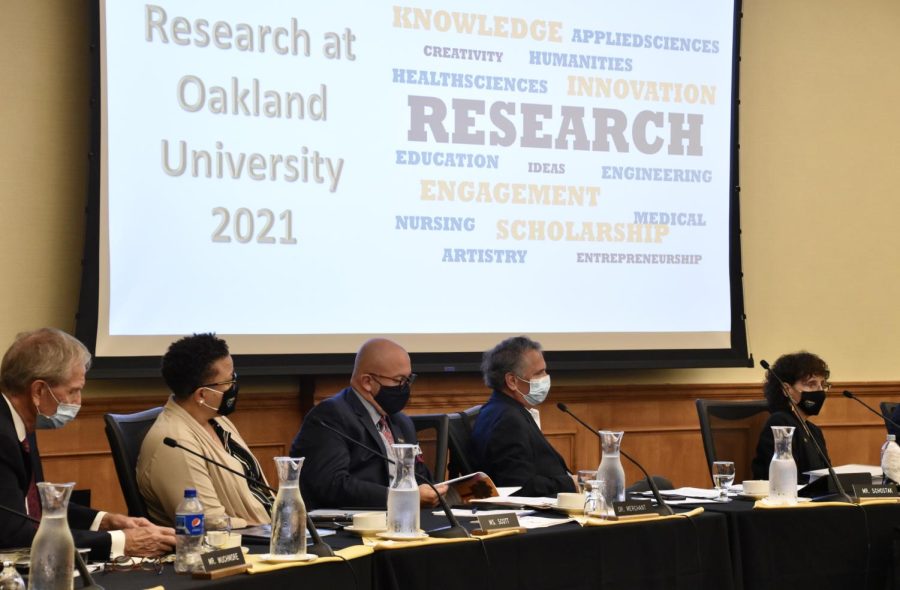Oct. 11 BOT meeting: research, investments and new faculty contract
President Pescovitz alongside members of her cabinet and the Board of Trustees at Monday’s BOT meeting.
On Oct. 11, the Oakland University Board of Trustees (BOT) met to discuss the acceptance of gifts and pledges to OU, to vote on the acceptance of union collective bargaining agreements from the OU Campus Maintenance and Trades Union and the OU American Association of University Professors (AAUP) and to discuss the 2023 fiscal year capital outlay program.
Recently appointed the chair of the BOT — following his tenure in the vice-chair position — Robert Schostak expressed how “amazing” it was to be presiding over the BOT this semester. He also expressed extreme happiness when reflecting on how he has come to participate on the BOT and offered his view on what a BOT member should bring to the table.
“I was a graduate of Oakland University,” Chair Schostak said. “I’ve always been interested in serving at Oakland. I graduated from here 43 years ago … and my personal interest was first to come back and serve first as an ambassador to one of the advisory boards, and then ultimately to be appointed [to the BOT]. Every board member should bring some to the needs of the university.”
To start the meeting, the BOT highlighted and applauded OU President Ora Hirsh Pescovitz’s gift of $1 million to the university. Given in the form of endowments, Pescovitz’s gift will fund Honors College scholarship programs for students who have exceptional problem-solving skills, display high levels of creativity and intellectual curiosity and who are committed to improving their communities.
Following the applause for her gift, President Pescovitz spoke about the importance of the recognition of Indigenous people and gave a short presentation about OU’s relationship with Indigenous Peoples Day. This gradually transitioned into a brief presentational overview of the last academic year, with a particular focus on the amount of on-campus resurgence in student involvement that the university has experienced so far this semester.
An issue that was presented at length by David A. Stone, associate vice president for research, was last year’s success in the areas of faculty and student research. Despite the restrictions and difficulties that resulted from the COVID-19 pandemic, departments and areas throughout the university — from the Center for Cybersecurity to the Political Science Department Professor Peter Trumbore’s research on the North Ireland Peace Process — worked vigorously throughout the year.
Research funding requests made by university faculty were surprisingly high — given the expected downturn in research due to in-person collaboration restrictions — with professors receiving assistance from and working with entities ranging from the General Motors Company to the United States Army.
Much of the meeting was spent on the BOT’s discussion of financial matters. The “Fiscal Year 2023 Five-Year Capital Outlay Plan,” Treasurer’s Report and Financial Statements constituted a majority of the discussion following presentations by the academic department representatives on the growth of their respective schools. Following updates given by firms responsible for managing OU’s short term and long term investments — in the areas of equity, real assets, fixed income and alternative investments — the BOT was quite focused on the role of the principles of diversity, equity and inclusion within these companies.
“The totality of the investment manager is looked at — meaning their capabilities, their diversity, the diversity of their investments and their historical returns,” Chair Schostak said. If they have a great history of great returns [on investments], with diversity, they’re going to be thought of highly by us.”
The end of the BOT meeting saw President of Oakland University’s Chapter of the American Association of University Professors (OU AAUP) Karen Miller utilize the public comment function of the meeting to address lingering concerns held by OU AAUP members on the recently finalized three year faculty contract. They explained that the university’s administration should not consider this agreement a permanent solution to the fundamental disagreements that persisted in the contract bargaining process. After the speech concluded, the BOT did not offer a response or comment on Chair Schostak’s procedural inquiry.











Anonymous • Oct 13, 2021 at 5:37 PM
What a lovely meeting of the Mutual Admiration Society! Proclaiming “generosity” from housetops, flaunting OU’s financial strength after having screwed faculty over, and offering lip service to Indigenous people warrant beatification, at the very least! Rejoice, all ye people! Sing praises!